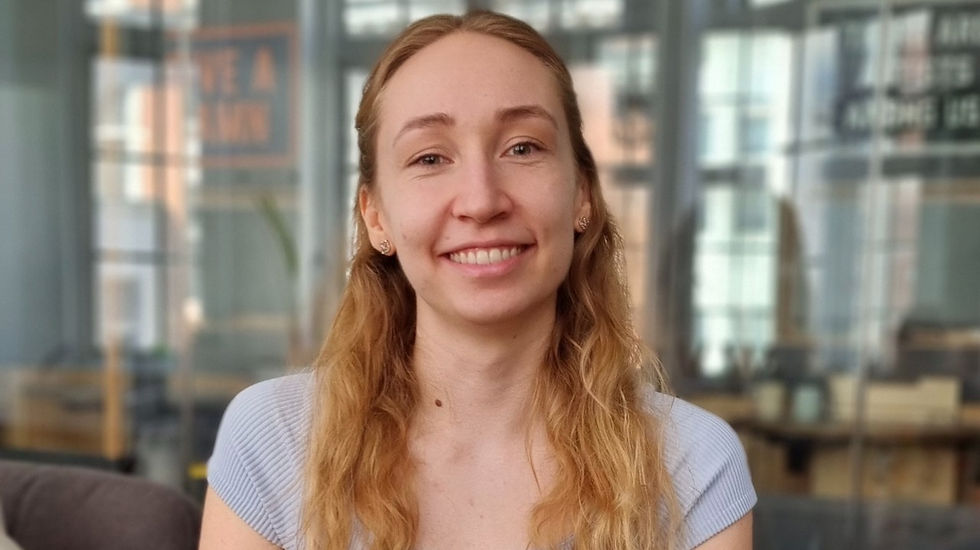FUTURE LAB: An Interview with iSABELLA BOTTLE
- erin1498
- Jun 30, 2025
- 3 min read
What three vital things should the world know about you or your background?
1. I grew up in a family of artists, where making was a primary activity. I continue to pursue the curiosity I developed as a child by seeking to work with others to create and share stories.
2. I studied History at university, where I developed an interest in how memory and acts of recording can shape how we understand the world and each other. I created an interdisciplinary zine inviting students to contribute essays, poetry and art on the theme of time, and organised a live music event to encourage conversation and creative exploration across disciplines.
3. Alongside my studies and writing for the university’s student newspaper, I wrote and directed my own play and designed the sets for seven student theatre productions. I enjoy exploring storytelling in different forms, and experimenting with how narratives can be shared and opened up to new audiences.
What made you want to embark on a creative career?
I used to help my parents run art workshops for families, and I became fascinated with seeing how other people work together through resourcefulness, creativity and collaboration. I think this curiosity around how making can encourage shared experience and mutual understanding fuelled my motivation to pursue a creative career.
I began committing to the pursuit of a creative career while at university, where I found I was happy to take on extra work and pressure in order to help create pieces of theatre, to publish independent zines, and publicise my peers’ creative work. Seeing live audiences interact with the work I had helped to produce confirmed my motivation to find a way to work in the creative industry. Most recently, illustrating and writing a historical children’s book and seeing children engage with it during museum workshops has confirmed my passion for devising storytelling methods that are inclusive, accessible and engaging for diverse audiences.
I also see creativity as a crucial tool for making positive change in the world today, and I believe that I will be the most motivated and feel the most gratified if I am working in the creative industries.
What is your future career goal?
In terms of a future career goal, I know that I want to pursue a path that enables me to work towards bringing people together through creative innovation and storytelling, perhaps through producing. Making theatre sets, writing and directing a play and coordinating photography and film promotion for these productions confirmed my passion for creating and sharing stories through a mixture of mediums. I also found it rewarding to work across departments and to solve problems through learning and collaborating, to achieve cohesive outcomes that pushed boundaries and our own expectations. I am still exploring different options, but I am interested in exploring brand storytelling at this point in my career because I am intrigued to learn more about how audiences for meaningful projects can be expanded and grown.
Ideally, I would like to work in a role where I can collaborate with people on a range of projects, in an environment that thrives on innovation and learning for the purpose of sharing compelling stories.
Who is your biggest inspiration in the creative world and why?
One of my biggest inspirations in the creative world is artist and stage designer Es Devlin. I am inspired by her work for theatre but also her book ‘An Atlas of Es Devlin’, which gives an insight into her processes of experimentation for building believable and engaging worlds. Devlin’s recent installation, ‘Library of Light’ wove music, literature and art together and included recordings of theoretical physicist Carlo Rovelli’s text, ‘The Order of Time’. I was inspired by the interdisciplinary nature of this work and the idea that audiences were invited to contribute a book to the library – representing sharing, learning and creating as crucial endeavours. I think that creative collaboration and an openness to learning will be key to finding solutions to some of the world’s greatest crises, and I see Devlin’s work as an example of how art can encourage this way of thinking and acting.
Where do you see the future of media heading?
I think that media will continue to move in a multitude of directions, but its development might be shaped by an increasing desire to nurture interpersonal connections and relationships, with a focus on quality rather than quantity. Where it could be said that quantity has been a driving force in the building of large influencer followings, the same curiosity surrounding the individual or the desire for online community might morph into more direct action for fostering engaged human connection.
Are you 18-25 and embarking on a creative career? Learn more HERE!







Comments